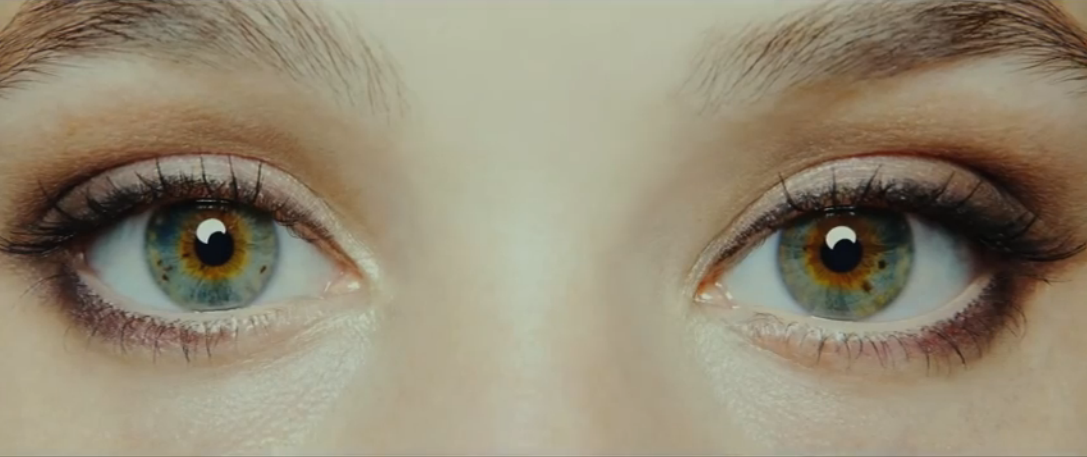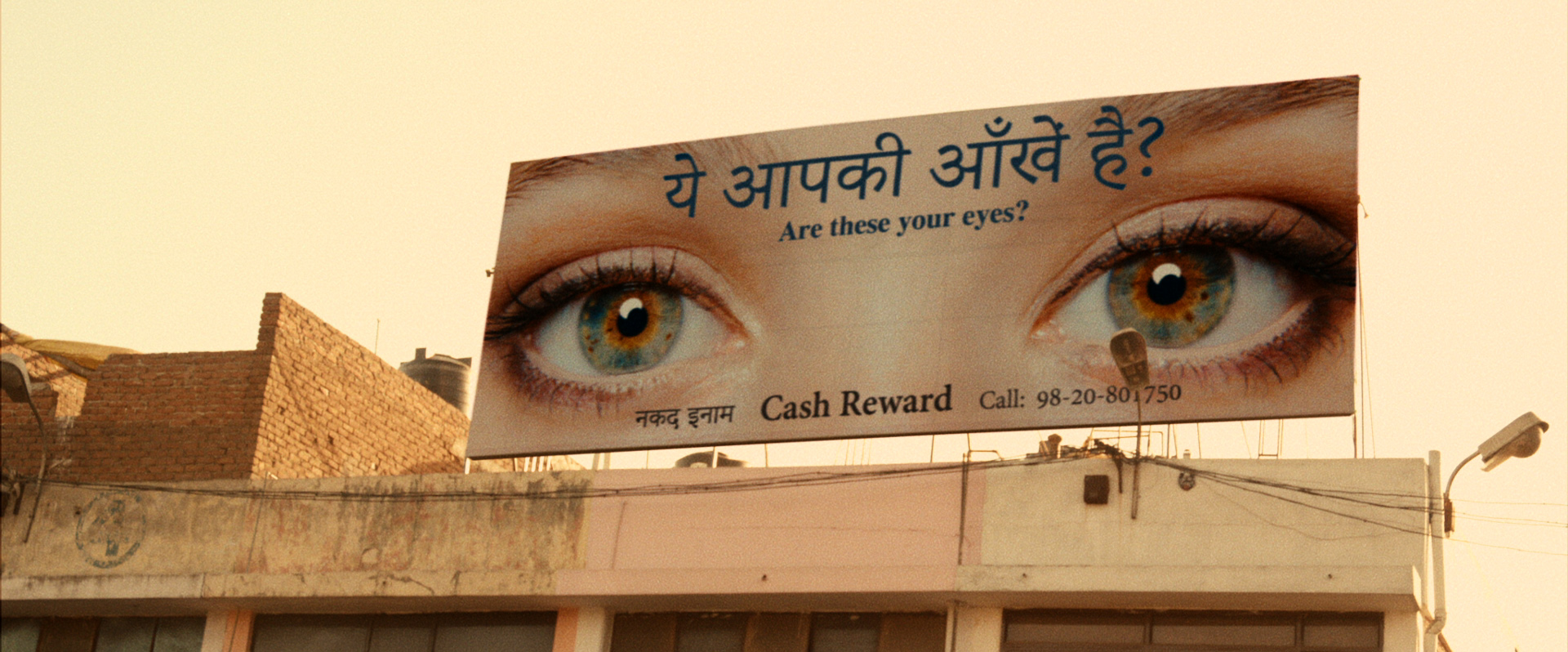MOVIE REVIEWS |
INTERVIEWS |
YOUTUBE |
NEWS
|
EDITORIALS | EVENTS |
AUDIO |
ESSAYS |
ARCHIVES |
CONTACT
|
PHOTOS |
COMING SOON|
EXAMINER.COM FILM ARTICLES
||HOME

Friday, July 25, 2014
MOVIE REVIEW
I Origins
The Eyes Have It (Or, Fifty Shades Of Dr. Gray)

A shot from
the first few seconds of Mike Cahill's scientific sex drama "I Origins".
Fox Searchlight
by
Omar P.L. Moore/PopcornReel.com
 FOLLOW
FOLLOW
Friday,
July 25,
2014
There are many things wrong with "I Origins". The talented
director Mike Cahill typically takes investigative and exploratory forays in his
films to entertain boundary-breaking ideas, alternate world journeys and
connections. In "I Origins" he offers his introductory look at the
intersection of science, reincarnation and religion. Regrettably, Mr.
Cahill's lead character (and actor) waters down any earnest points the director
makes about those conversational issues.
Molecular biologist Dr. Ian Gray (Michael Pitt), a New York cynic, odysseys
through exclusively recessive eyes in his studies, assisted by scientist Karen
(Brit Marling). Ian doesn't believe in the spiritual world, he says.
"I believe in proof." The proof in "I Origins" however, isn't in its own
pudding, though the film posits intriguing ideas for discussion over solid facts
or truths. In a scene after its end credits, "I Origins" indulges fancy
rather than empiricism via a tired, lingering subplot.
Ian meets Sofi (Àstrid Bergès-Frisbey), a facially-covered, scantily-clad model
sitting alone outside at a party. Sofi, who has sophistication, has been waiting specifically
for him. Ian is fascinated by Sofi's eyes and asks to photograph
them. After acceding the "exotic" Sofi has sex with Ian. (Don't
all women want instant sex with a bland stranger photographer/science guy?)
After they sex it up Sofi abruptly flees. (Maybe Ian didn't fit the bill
for her after all.) Yet Ian's convinced there's something deeper between
them, that he's known Sofi forever. Alas, the film's script doesn't flesh
this out, opting for symbolism that clouds a wandering, predictable story.
More bizarre, Ian's discoveries and setbacks are tied exclusively to real (or
potential) sexual episodes that he has. The horny scientist obstructs his
(and the film's) science-reincarnation-spirituality mission. The
talk-over-your-head science-speak is pure gimmick, an interlude from sex.
Sex in "I Origins" represents recklessness. Almost everything in
"I Origins", in Ian Gray's search for eyes, spirituality and rebirth in his
experiments is driven sexually -- in tragedies, triumphs, setbacks and through
suggestiveness. Throughout, via a camera, or gazes at photos, websites and
videos, the voyeur Ian experiments on the female gender more than on anything
eye-related. It's all eye-candy for the eyes and anything but for the
brain.
As an actor Mr. Pitt's talent, in romances and non-serious fare, is limited to a
handsome face, and the first half of "I Origins" plays more like Bernardo
Bertolucci's "The Dreamers", with Mr. Pitt's shallow, uninteresting, monotone
Ian bedding two women in the first hour without much effort or objection.
Mr. Pitt is often better in dramas ("Boardwalk Empire") that don't require large
doses of his presence. He stands out better in the background in films,
especially ensembles, rather than as a lead player.
The sexual themes destroy much of the second half of "I Origins", with a
disturbing undercurrent in its optics once the film globe trots to India.
Why, for example, is a grown, white middle-class married man and father taking
an impoverished, homeless young girl child from India who can't speak much
English, and is alone, to his hotel room? It's the second and only other
stranger Ian spends time alone with on first sight. Both are female.
With its ideas on science, children and spiritual connection, the scene
in India is a stark one in its wrongheadedness and exploitative, molestation
subtext given what we learn about Ian. It's a scene that screams of a possessiveness,
even
colonialism, that backfires on any good intentions the film or director has.
The scene encapsulates everything that was wrong with this year's "Million
Dollar Arm", also partly set in India. Does the dirt-poor little girl from
India get the cash reward the film's billboard promises? We never know.
A second, much older female in India doesn't know Ian but trusts him.
She's attractive (and may or may not want to sleep with Ian.) A child
supervisor in India, she stays away from supervising the small Indian girl Ian tells her
he's found until after he's finished experimenting with her in his
hotel room. It's truly bizarre and bewildering.
Parts of the script aren't developed at the most crucial times, and where "I
Origins" falls hardest is in its third act, the weakest act, which should have
been its strongest and most enlightening. The resulting overall feeling of
"I Origins" and its conclusion rings flat not revelatory, muted not celebratory.
"I Origins" should have been a cause for rejoicing but was a reason
for me to go quietly to sleep after two hours of near-paralyzing boredom.
Every aspect of "I Origins" marginalizes its women for the sake of the
passive self-aggrandizement, sexual enhancement, possession and entitlement of
Ian. We know little about Sofi, and Ms. Bergès-Frisbey's character spends
the film half-naked, fearful, or concerned about marriage. Or all three.
Sofi is a
reductionist character, as incomplete to us as to Ian. Karen
meanwhile, a smarter, more rational sort than the impulsive Ian, is
challenged and labeled by Ian as "stubborn" in one scene. The film also
makes a weathervane of Karen within five minutes. There's no hint of
romantic or sexual tension between Ian and Karen but the magic dust mandates
attraction at a key moment. Ian is a horn-dog, and doesn't believe in
spirituality because he's either fearful or obviously spiritually empty.
Ian is held up in "I Origins" as an idealized sexual Medusa
(just-lay-eyes-on-him-and-you'll-want-to-sleep-with-him) rather than a
scientist. Maybe Ian is an able-bodied Stephen Hawking in disguise.
Ian, a misogynist vulture of science, gives his discipline more of
a bad name than either religion or reincarnation get in films. (That's
if you exclude the Will Smith film "Seven Pounds".) Mr. Cahill creates an
atmosphere too ready-made and convenient at times. All in all,
I cancelled these eyes and quickly forgot this movie.

A shot from Mike Cahill's scientific sex drama "I Origins".
Fox Searchlight
The diversity of colors of recessive eyes in "I Origins" predominate over the
skin colors of characters in it. Since the film invests in model-type but
lukewarm white characters and dismisses
more interesting or appealing Black and Asian ones as curiosities and
window-dressing, scope is narrower and less elastic than the film should have
been. The result is that falseness emerges when Ian and Karen achieve
breakthroughs involving people who may have eye "matches" -- who
may be Black! (Wow!) Any not-so veiled insights regarding
race and science, once a bedrock of the racist theories of Eugenics, are treated as profundity
in "I Origins" but are insulting.
The "color" characters are sidelined for expedience, straw-men and women who are
either red herrings or objects of ridicule. Steven Yeun plays Kenny, the
obligatory (insert your black-Asian-Latino best friend here) scientist buddy of Ian. Kenny is
smarter, funnier and more luminous than the self-involved and beleaguered beings
"I Origins" gives far more screen time to. Kenny is the film's
doormat when he should be its lead figure.
Had "I Origins" explored its premises by starting at its end and finishing at
its start
through the eyes of characters it relegates it would have been interesting. The big problem is that while Mr. Cahill
probes spiritual-scientific connections he does so with his most
uninteresting characters. The key characters that he should have spent more time
with aren't onscreen enough to be appreciated,
including the little girl.
A billboard in India that asks "are these your eyes?" may be an invitation to global
assimilation in a vastly sepia-complexioned, dominant-eyed world that
historically views nomadic (or "politely" predatory) figures like Ian as outsiders
(or conquerors.) The billboard's inquiry is a search for Ian's own
belonging in the world as much as a plea for universality or common ground,
which may be part of the spiritual journey "I Origins" itself
intends to traverse. Yet the India portion of "I Origins" feels hokey, tacked
on and finally, a cop out. Pronouncing the film's breakthroughs (or
overall scientific eurekas) as having "global implications" is a euphemistic
type of self-importance or at worst, a bottomless ethnocentrism.
Mr. Cahill's muting of glamour in good-looking actors to suit the more abstract parts of his films -- in "I Origins"
the targets are real-life models Ms. Bergès-Frisbey and Mr. Pitt -- worked in the soulful and
barren "Another Earth" but here it is Mr. Cahill's script that betrays him.
I wish Ms. Marling, who co-wrote "Another Earth" with the director, had
wrote "I Origins". In her hands a deeper, less obvious, less transparent and more
ambiguous rendering would have been achieved.
With: Archie Punjabi, Cara Seymour, William Mapother, Venida Evans, Crystal Anne
Dickinson, Charles W. Gray, Kashish.
"I Origins" is rated R by the Motion Picture Association Of
America for some sexuality/nudity and language.
Its running time is one hour and 57 minutes.
COPYRIGHT 2014. POPCORNREEL.COM. ALL RIGHTS RESERVED.  FOLLOW
FOLLOW
MOVIE REVIEWS |
INTERVIEWS |
YOUTUBE |
NEWS
|
EDITORIALS | EVENTS |
AUDIO |
ESSAYS |
ARCHIVES |
CONTACT
| PHOTOS |
COMING SOON|
EXAMINER.COM FILM ARTICLES
||HOME

 FOLLOW
TWEET
FOLLOW
TWEET
 FOLLOW
FOLLOW